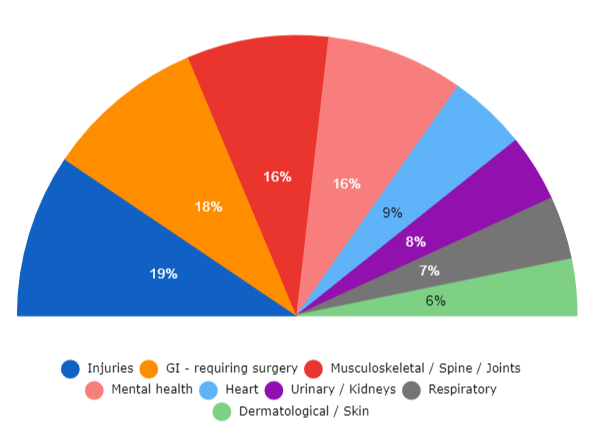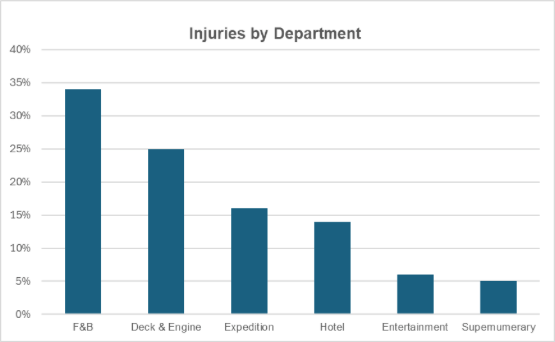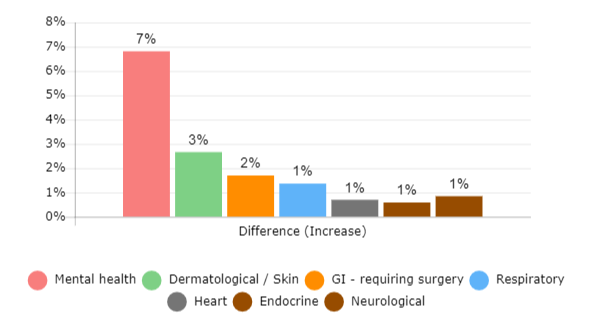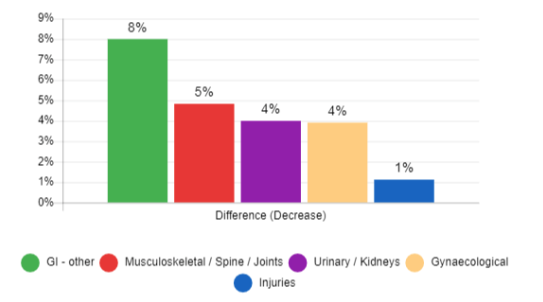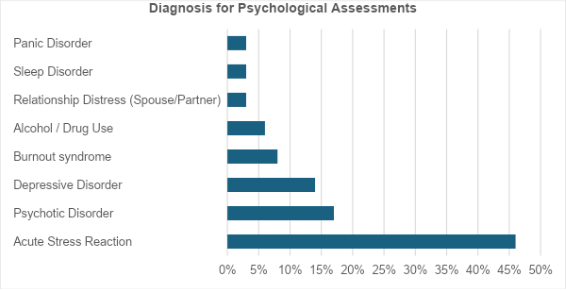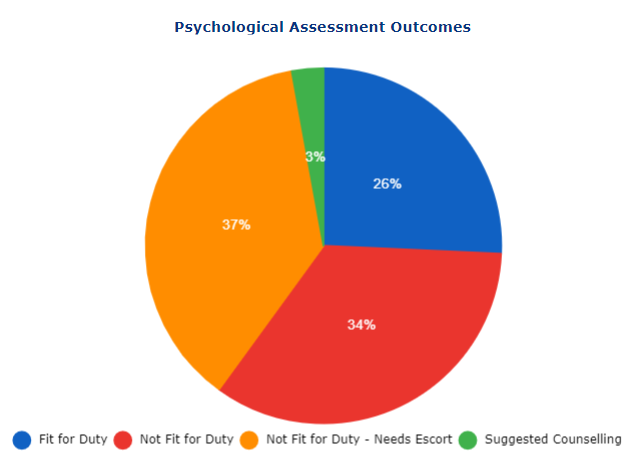
Exploring Maritime Medical Emergency Trends from VIKAND Insights
Delivering better medical care at sea starts with understanding the unique healthcare challenges faced by those onboard. VIKAND’s Case Management division handles thousands of incidents annually, providing us with valuable data on the causes and outcomes of diverse health events among guests and crew.
We recently undertook the task of compiling and analysing our 2023 case management data to help us better understand the causes of crew medical emergencies, diagnostic trends and other patterns. The data and insights below pertain strictly to crew members and remain top line for the purpose of supporting clear analysis and useful conclusions.
Crew Medical Emergencies & Diagnosis
Among 2023 crew case management records, the top five diagnosis categories were:
- Injuries
- Gastrointestinal issues requiring surgery (e.g. appendicitis)
- Musculoskeletal, spine and joint emergencies
- Mental health
- Heart conditions
Injuries by Department
Most injuries among crew members were centred on three departments: food and drink, deck engine and expedition. Entertainment and supernumerary had a small share of injuries compared to other departments.
Rising Medical Issues in 2023
Viewed against data from 2022, a few noteworthy trends emerged last year:
- There was a significant increase in mental health emergencies, which we will investigate in more detail in the psychological assessments section.
- We found a slight increase in dermatological issues among crew members.
Reduction in Disembarkations in 2023
Case management data from last year showed a reduction in disembarkations for the specific medical issues in the graph above. It’s challenging to pinpoint specific reasons why, but it may be attributed to several factors, such as better onboard diagnostics (i.e. fewer instances of misdiagnosis), better training programs leading to less injuries, and more effective treatment from onboard medical teams with shoreside support. This last factor weighs heavily on avoiding unnecessary disembarkations.
To gain insights on the increase in mental health emergencies, we reviewed crew psychological assessments to better understand both trending diagnoses and possible causes. We also looked at outcomes following these assessments.
Drilling Into Mental Health
From the assessments present in case management data, we identified several trends:
Stress reaction is the most common diagnosis following a psychological assessment, followed by burnout, depression and psychotic disorders. Relationship distress, alcohol and drug use, panic and sleep disorders remained a small percentage of diagnoses.
Contributing Factors in Psychological Assessments
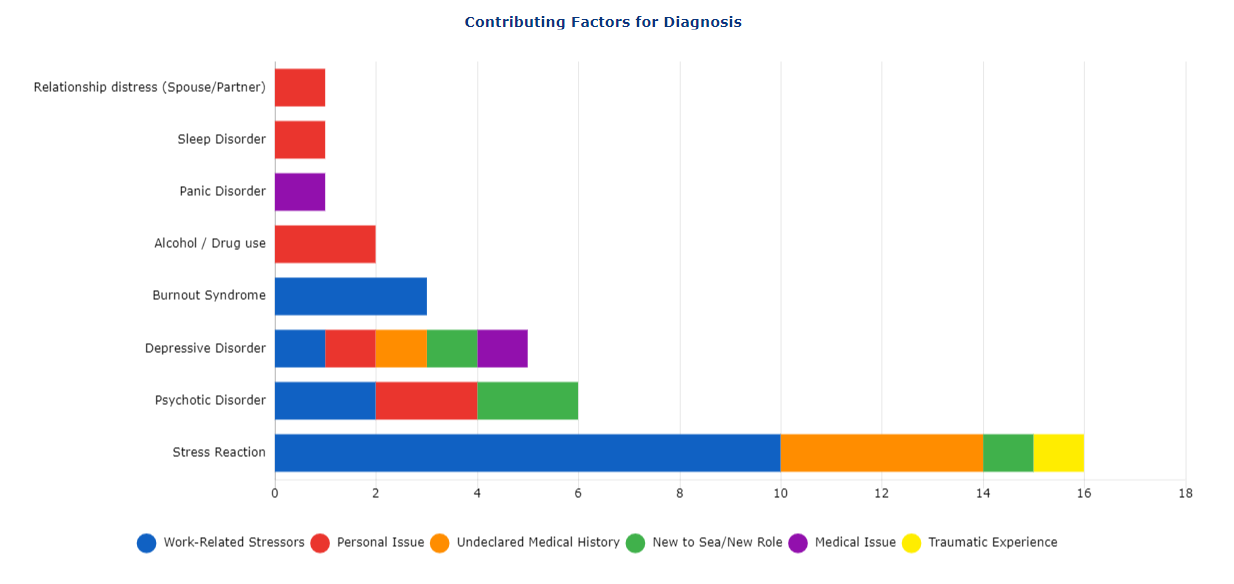 Unsurprisingly, work-related stress was the main factor associated with a stress reaction diagnosis. However, common underlying factors included undeclared medical history, such as prior issues dealing with work stressors resulting in a stress reaction, as well as being new to sea or new to their role.
Unsurprisingly, work-related stress was the main factor associated with a stress reaction diagnosis. However, common underlying factors included undeclared medical history, such as prior issues dealing with work stressors resulting in a stress reaction, as well as being new to sea or new to their role.
Another trend we saw among stress reaction diagnoses: Previously struggling with a depressive disorder, or having an underlying psychotic disorder triggered by work stress, personal issues, being new to sea or new to their role, and existing medical issues.
Psychological Assessment Outcomes
Around 1 in 4 crew members assessed were found fit for duty and able to resume work. The remaining 3 out of 4 were declared unfit for duty, with a third of those needing to be safely escorted home for further treatment. A small minority required further counselling to support their wellbeing and resume working onboard.
In 2023, the leading diagnosis for sick leave in northern Europe was “Acute Stress Reaction”. The simple explanation is that when people acutely seek medical help because they feel unable to perform their duties, they are typically in some sort of crisis.
Even if there are underlying depressive, psychotic or personality-based issues, the result is a stress reaction. Therefore, it should not be interpreted that stress itself is the main problem for seafarers, but rather the main reason they seek help.
The noticeable rise in mental health emergencies initially seems alarming, but this could also be seen as a positive indicator similar to the process of psychological therapy, where patients feel worse before starting to recover. The increase suggests that more people are seeking help as barriers to care are removed and the stigma around mental health is lifted. By normalising mental health issues and educating the public on signs and symptoms, we lower the threshold for seeking assistance.
As a result, this rise we saw in reported cases and referrals may not necessarily reflect a worsening problem, but instead indicate that we are moving in the right direction towards better support, awareness and acceptance of mental health issues.
Our goal is to proactively support seafarers through wellness programs and preventive measures that not only assist during emergencies, but also build and strengthen resilience, helping them mitigate acute stress reactions and the subsequent need for medical disembarkation.
VIKAND Case Management
A chronic illness or injury can arise for anyone at any time. And when a valued crew member or guest requires emergency shoreside treatment or hospitalisation, maritime operators need support from medical case management experts. VIKAND’s Case Management team provides 24/7 support, coordination, reporting and expertise for health emergencies worldwide.
We manage thousands of cases a year, and as an added benefit, our team members are all experienced maritime professionals who understand the unique challenges of delivering exceptional healthcare at sea. To learn more about VIKAND’s medical case management platform, visit us online at vikand.com/case-management.


